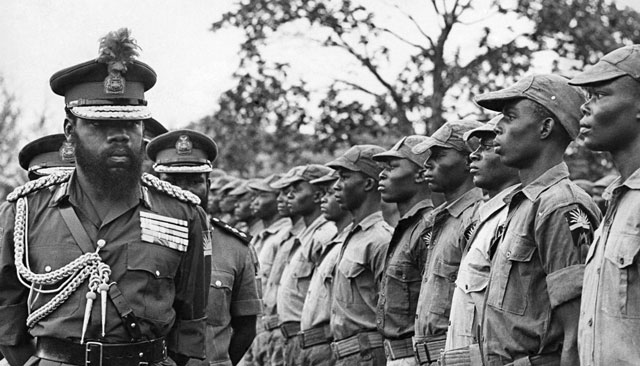
Umuahia, Nigeria | AFP | Nigeria on Tuesday marks 50 years since the declaration of an independent Republic of Biafra plunged the country into a civil war, amid renewed tensions and fresh calls for a separate state.
The main pro-independence groups — the Indigenous People of Biafra (IPOB), and the Movement for the Actualisation of the Sovereign State of Biafra (MASSOB) — have called for a day of reflection.
People in the southeast have been urged to stay at home to commemorate the secession, which happened on May 30, 1967.
But many fear an eruption of violence and Nigeria’s security forces have said they are on red alert in hotspots in the former republic, such as Aba and Onitsha, where protests last year turned bloody.
In 1970, after nearly three years of fighting, Biafran soldiers who were outnumbered 10 to one by federal troops and under-equipped, laid down their arms.
The conflict caused an estimated million deaths, many of them caused by starvation after the secessionist region was blockaded.
With surrender went their dreams of a separate state for the Igbo people, who are the majority in the southeast.
Half a century later, Biafra remains an extremely sensitive subject in Nigeria.
“Nigeria did nothing for us since the end of the war. We have no roads, no infrastructures, no jobs. It’s time to achieve what our fathers started,” John Ahaneku, 48, told AFP.
– Turning point –
Igbo frustrations have grown over the decades.
During the long years of military government after the end of the war, they felt excluded from economic and political power.
Both have been dominated by the two other main ethnic groups in the country, the northern Hausa-Fulani and the Yoruba from the southwest.
But it was only after the return to democracy in 1999 that secessionist aspirations began to slowly resurface.
The current main pro-independence groups want a referendum on self-determination.
They accuse the former military ruler Muhammadu Buhari — a northern Muslim who was elected civilian president in 2015 — of violently repressing their freedom of expression.
The arrest and incarceration towards the end of 2015 of IPOB leader Nnamdi Kanu on treason charges has been seen as a turning point.
Amnesty International has accused the Nigerian security forces of killing at least 150 IPOB supporters in 2016, a claim Abuja flatly denies.
At least 60 were killed during commemorations for the civil war on May 30 last year, the human rights group alleged.
– Separatist solidarity –
On Thursday, Vice-President Yemi Osinbajo — standing in for the absent Buhari, who is on indefinite medical leave — warned against the eruption of violence.
Nigeria is made up of some 250 ethnic groups and broadly divided between a largely Muslim north and mainly Christian south.
The 50th anniversary of Biafra was “an opportunity for individual and collective introspection”, Osinbajo told a conference on the civil war in Abuja.
“Today some are suggesting that we must go back to the ethnic nationalities from which Nigeria was formed.
“Clearly our strength is in our diversity, that we are greater together than apart.”
Abuja currently faces a number of sometimes violent separatist claims that threaten the country’s unity, not least Boko Haram’s insurgency to create a hardline Islamic state in the northeast.
In the oil-producing Niger delta, some of which was part of independent Biafra at the start of the war, sabotage by armed rebel groups in 2016 led to a slump in production, hitting Nigeria’s economy.
Despite their diverging interests, pro-Biafra groups and Niger Delta rebels have publicly expressed mutual solidarity.
– Wrong approach –
On Friday, the federal police denounced “planned protests and order of market closures” on May 30 and said it was “deeply concerned with the security implications”.
Police “will not hesitate to deal decisively with any group(s) and their sponsors that attempt to cause disturbance of the peace or carry out any unlawful demonstration”, spokesman Jimoh O. Moshood warned.
According to analysts, the suppression of pro-Biafra protests is the wrong response and has only hardened more young people’s attitudes in favour of independence.
A study this month by London-based SBM Intelligence suggested there was “rising support for a Biafra” in Nigeria’s southeast and south.
“A total of 42.5 percent of all respondents believe that both regions should make up a future Biafran state,” it said.
“However, just under half, 49.3 percent, of the total respondents still believe that the way forward for the Nigerian state is as one country, but with ‘true federalism’ being practised.”
Security consultant Don Okereke said: “You can’t kill an ideology with a gun.”
This morning, I am at the Yar’Adua Centre, Abuja for an event themed: MEMORY & NATION BUILDING. BIAFRA: 50 YEARS AFTER…A Sober Reflection. pic.twitter.com/ZrWdXqsWjm
— Prof Yemi Osinbajo (@ProfOsinbajo) May 25, 2017
 The Independent Uganda: You get the Truth we Pay the Price
The Independent Uganda: You get the Truth we Pay the Price



